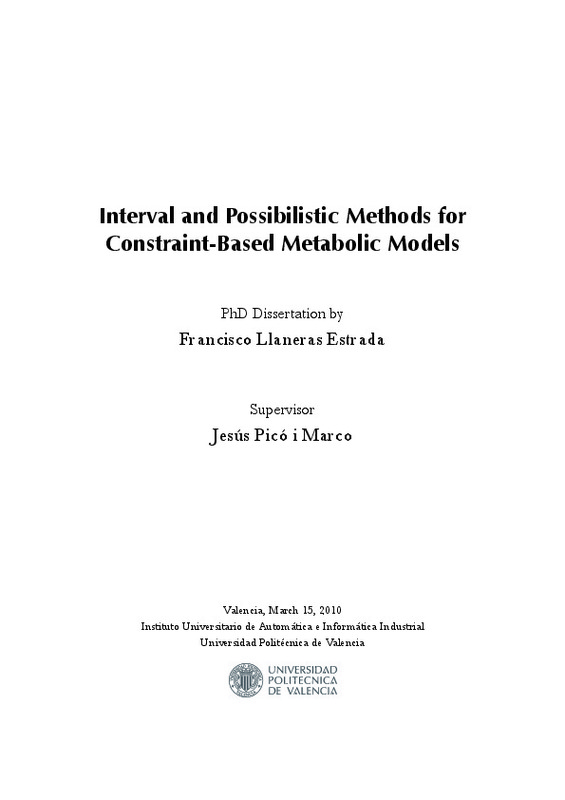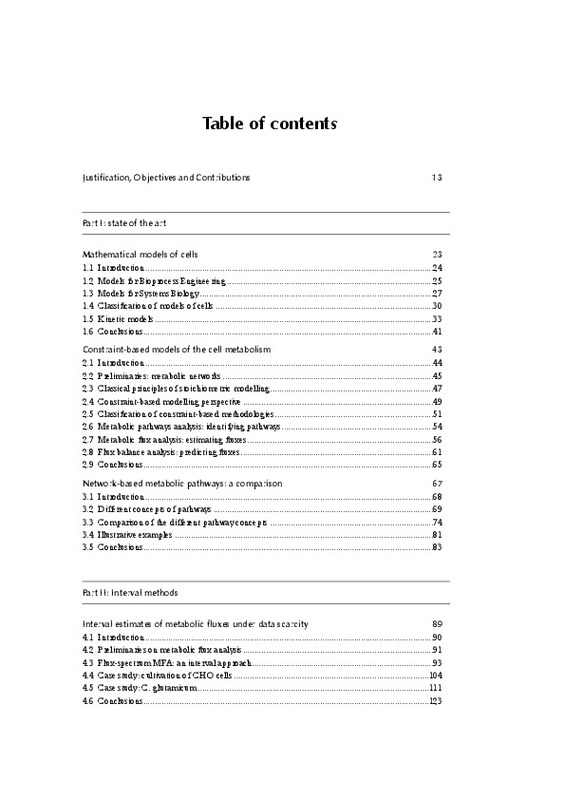- RiuNet repositorio UPV
- :
- Investigación
- :
- Tesis doctorales
- :
- Ver ítem
JavaScript is disabled for your browser. Some features of this site may not work without it.
Buscar en RiuNet
Listar
Mi cuenta
Estadísticas
Ayuda RiuNet
Admin. UPV
Interval and Possibilistic Methods for Constraint-Based Metabolic Models
Mostrar el registro sencillo del ítem
Ficheros en el ítem
| dc.contributor.advisor | Picó Marco, Jesús Andrés
|
es_ES |
| dc.contributor.author | Llaneras Estrada, Francisco
|
es_ES |
| dc.date.accessioned | 2011-03-23T10:34:20Z | |
| dc.date.available | 2011-03-23T10:34:20Z | |
| dc.date.created | 2011-03-15T09:00:00Z | es_ES |
| dc.date.issued | 2011-03-23T10:34:15Z | es_ES |
| dc.identifier.uri | http://hdl.handle.net/10251/10528 | |
| dc.description.abstract | This thesis is devoted to the study and application of constraint-based metabolic models. The objective was to find simple ways to handle the difficulties that arise in practice due to uncertainty (knowledge is incomplete, there is a lack of measurable variables, and those available are imprecise). With this purpose, tools have been developed to model, analyse, estimate and predict the metabolic behaviour of cells. The document is structured in three parts. First, related literature is revised and summarised. This results in a unified perspective of several methodologies that use constraint-based representations of the cell metabolism. Three outstanding methods are discussed in detail, network-based pathways analysis (NPA), metabolic flux analysis (MFA), and flux balance analysis (FBA). Four types of metabolic pathways are also compared to clarify the subtle differences among them. The second part is devoted to interval methods for constraint-based models. The first contribution is an interval approach to traditional MFA, particularly useful to estimate the metabolic fluxes under data scarcity (FS-MFA). These estimates provide insight on the internal state of cells, which determines the behaviour they exhibit at given conditions. The second contribution is a procedure for monitoring the metabolic fluxes during a cultivation process that uses FS-MFA to handle uncertainty. The third part of the document addresses the use of possibility theory. The main contribution is a possibilistic framework to (a) evaluate model and measurements consistency, and (b) perform flux estimations (Poss-MFA). It combines flexibility on the assumptions and computational efficiency. Poss-MFA is also applied to monitoring fluxes and metabolite concentrations during a cultivation, information of great use for fault-detection and control of industrial processes. Afterwards, the FBA problem is addressed. | es_ES |
| dc.language | Inglés | es_ES |
| dc.publisher | Universitat Politècnica de València | es_ES |
| dc.rights | Reserva de todos los derechos | es_ES |
| dc.source | Riunet | |
| dc.subject | Models | es_ES |
| dc.subject | Systems biology | es_ES |
| dc.subject | Biological systems | es_ES |
| dc.subject | Metabolic network | es_ES |
| dc.subject | Constraint-based model | es_ES |
| dc.subject | Metabolic flux analysis | es_ES |
| dc.subject | Uncertainty | es_ES |
| dc.subject | Estimation | es_ES |
| dc.subject | Monitoring | es_ES |
| dc.subject | Validation | es_ES |
| dc.subject | Pichia pastoris | es_ES |
| dc.subject | Cho cells | es_ES |
| dc.subject | Escherichia coli | es_ES |
| dc.subject | Reliability | es_ES |
| dc.subject.classification | INGENIERIA DE SISTEMAS Y AUTOMATICA | es_ES |
| dc.title | Interval and Possibilistic Methods for Constraint-Based Metabolic Models | |
| dc.type | Tesis doctoral | es_ES |
| dc.identifier.doi | 10.4995/Thesis/10251/10528 | es_ES |
| dc.rights.accessRights | Abierto | es_ES |
| dc.contributor.affiliation | Universitat Politècnica de València. Departamento de Ingeniería de Sistemas y Automática - Departament d'Enginyeria de Sistemes i Automàtica | es_ES |
| dc.description.bibliographicCitation | Llaneras Estrada, F. (2011). Interval and Possibilistic Methods for Constraint-Based Metabolic Models [Tesis doctoral]. Universitat Politècnica de València. https://doi.org/10.4995/Thesis/10251/10528 | es_ES |
| dc.description.accrualMethod | Palancia | es_ES |
| dc.type.version | info:eu-repo/semantics/acceptedVersion | es_ES |
| dc.relation.tesis | 3499 | es_ES |
Este ítem aparece en la(s) siguiente(s) colección(ones)
-
Tesis doctorales [5389]







![Text file [Text]](/themes/UPV/images/text.png)


